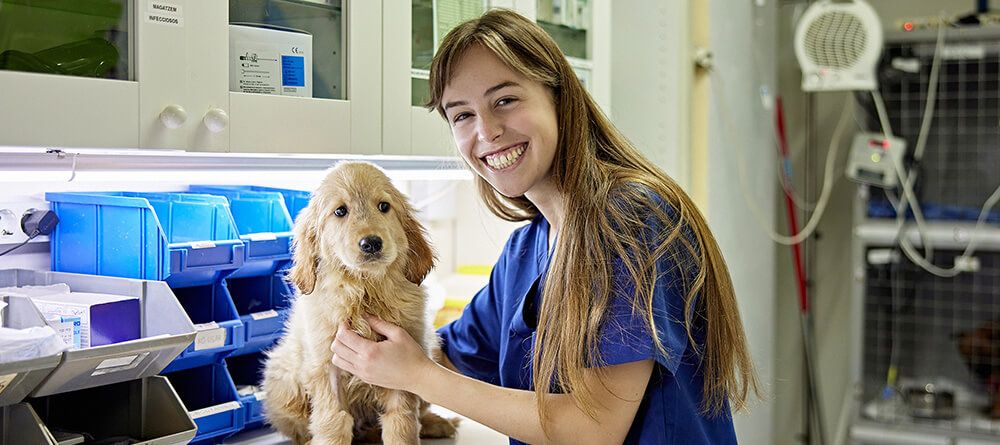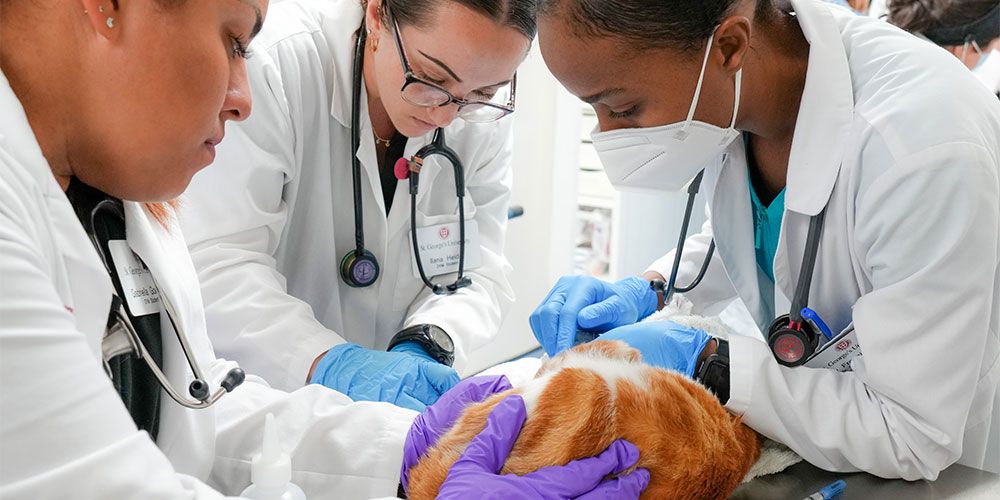The process of completing vet school applications can seem confusing on the surface. But the Veterinary Medical College Application Service (VMCAS) makes it as easy as possible. It’s a centralized service that reduces the amount of work students need to do—you just need to familiarize yourself with how it all works. To help you get a handle on it, we’re addressing some of the most common questions about vet school applications and the VMCAS process.
7 Common VMCAS questions
Getting started with your vet school applications is much less daunting once you know the basics. The following queries relate specifically to VMCAS. If you have questions about a particular program or its requirements, you’ll want to reach out to the school directly.
1. When should you start your VMCAS application?
It’s important to note that applying to veterinary school isn’t a process you can complete in one sitting. Even if you’ve finished most of your prerequisite coursework and accumulated a substantial amount of relevant experience, packaging everything up can take some time. Students intending to start veterinary school the fall after graduating from college should begin putting together applications during the spring of their junior year. The application cycle opens in January, although applicants can’t select programs in their applications until May. It’s still smart to begin creating your account and filling out information as soon as the application cycle opens. The cycle then closes in September. You can keep an eye out for the specific application cycle dates by visiting the American Association of Veterinary Medical Colleges (AAVMC) website. You’ll want to verify deadlines for supplemental materials with the schools on your list as well. 
2. How many vet schools should you apply to?
Students have the option to apply to as many of the 39 VMCAS-participating programs as they wish. While you can aim for the maximum, it can be smart (and more cost-effective) to take a more focused approach. By the time you can officially select the programs you want to apply to in May, you should have already done a fair amount of research and made some decisions about which schools could be a good fit for your professional goals. There is no right number of schools to apply to. That said, it’s not uncommon for students to over-apply. It’s helpful to note that many programs reserve a substantial share of their seats for in-state students, so you could be battling the odds if you’re from a different area. And keep in mind that the more schools you apply to, the more time you’ll need to devote to supplemental materials and interviews. Be careful not to overextend yourself so you can continually put your best foot forward.
3. Can you apply to international vet schools through VMCAS?
In addition to US programs, VMCAS participants seek out programs in the Caribbean, Canada, and a number of other countries. That said, there are certainly some international schools that don’t use VMCAS. If you’re interested in any schools that aren’t available through the application, you’ll have to apply directly.
4. How much does applying with VMCAS cost?
Every student’s total VMCAS expense will be a little different. The initial fee, which includes one program, is $220. You’ll then need to pay $120 for each additional school you choose to apply to. You can view a clear breakdown of the application fee structure on the AAVMC website. Some individual programs also charge a supplemental fee. Don’t forget to take that into account as you determine what your final application costs will be. 
5. What does a completed application include?
Once you’ve completed the VMCAS process, your application will include numerous different components. Generally speaking, these are the standard application requirements:
- Completed course prerequisites
- Scores from the GRE or MCAT
- Letters of evaluation
- Official transcripts
- Animal and veterinary experience
- Essays
You’ll also fill out a personal information section and list any relevant awards or achievements. Different veterinary schools may have other requirements, so always be sure to look into any supplemental essays or other materials the schools on your list may be requesting.
6. When should you submit your VMCAS application?
While the VMCAS deadline isn’t until mid-September, it’s in your best interest to submit applications as soon as you can. That way, you can leave some time for any unexpected delays. It also can help ensure you won’t miss your chance because a school with rolling admissions already reached capacity. The suggested timeline from VMCAS recommends submitting six to eight weeks before the official application deadline. You’ll also be responsible for making sure you complete and submit any supplemental applications to schools by their specified deadlines. You do have the option to submit your application before your letters of evaluation and transcripts have been received. That said, don’t drag your feet on obtaining these materials. VMCAS will not accept late documents once the deadline has passed. 
7. What happens after you submit your application?
You’ll be able to check your application’s status once you’ve submitted it. After all materials have been received, VMCAS will send an email notifying you that your application has been verified. It will then be electronically sent to each of your specified programs. As such, any questions you have at this point should be directed toward the individual schools. Once veterinary schools review your application, they may extend an interview offer or even accept you outright—not every program conducts interviews. In the event that you don’t receive an acceptance letter, know that you aren’t alone. Getting into veterinary school is incredibly competitive. Use it as an opportunity to evaluate how you could potentially strengthen your application and consider applying to a different mix of schools; you may be surprised which programs could ultimately be a great fit for you.
Prepare for your vet school applications
Now that you have answers to some of the most common VMCAS questions, you can focus on finishing any remaining prerequisites and completing your vet school applications. You should also do a little more school-specific research once you’ve submitted everything. If you’re lucky enough to receive multiple acceptance letters, you’ll have to make some decisions. There’s more to picking a school than choosing the most familiar name. It’s a good idea to carefully compare veterinary schools to make sure you select the program that’s right for you. Learn more about the criteria you should consider by checking out our article “6 Things the Top Veterinary Schools Have in Common.”

